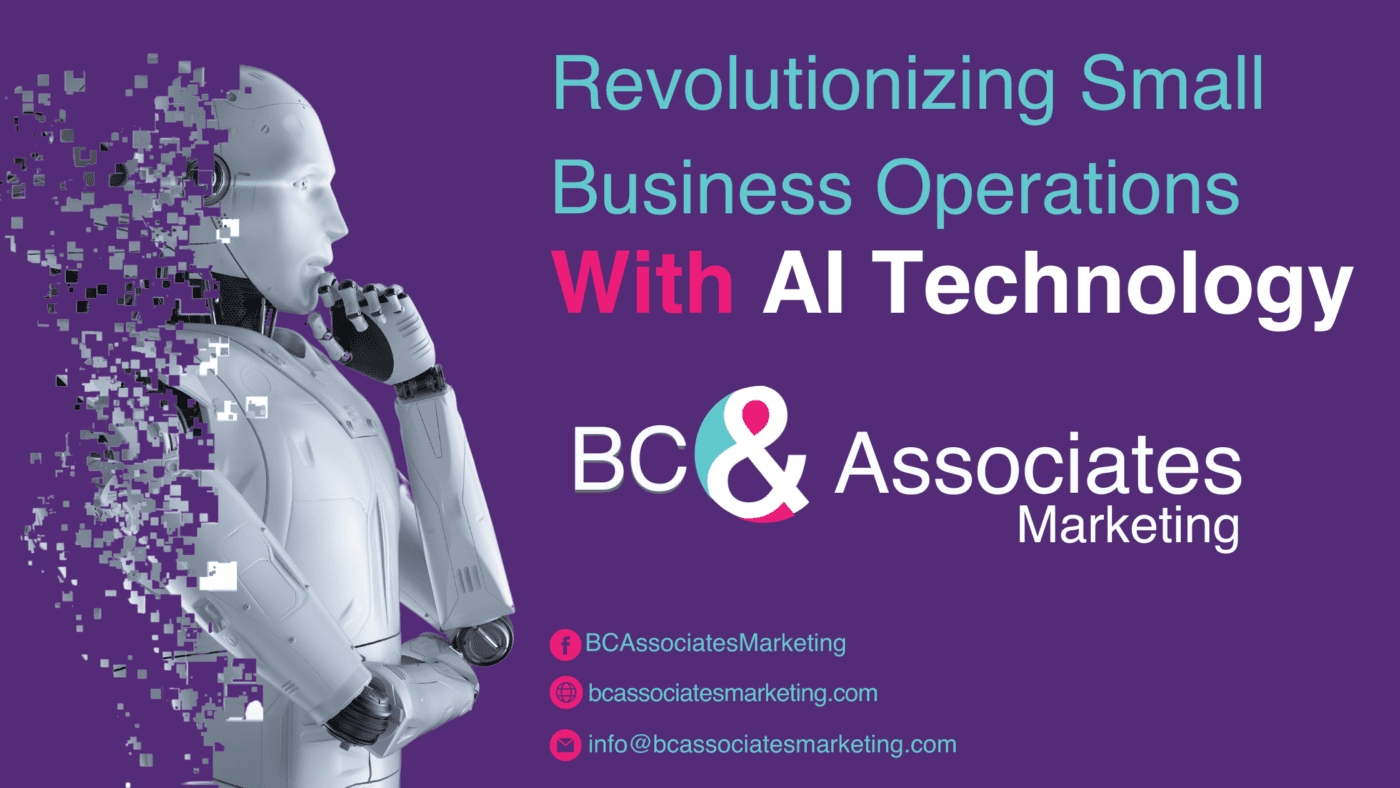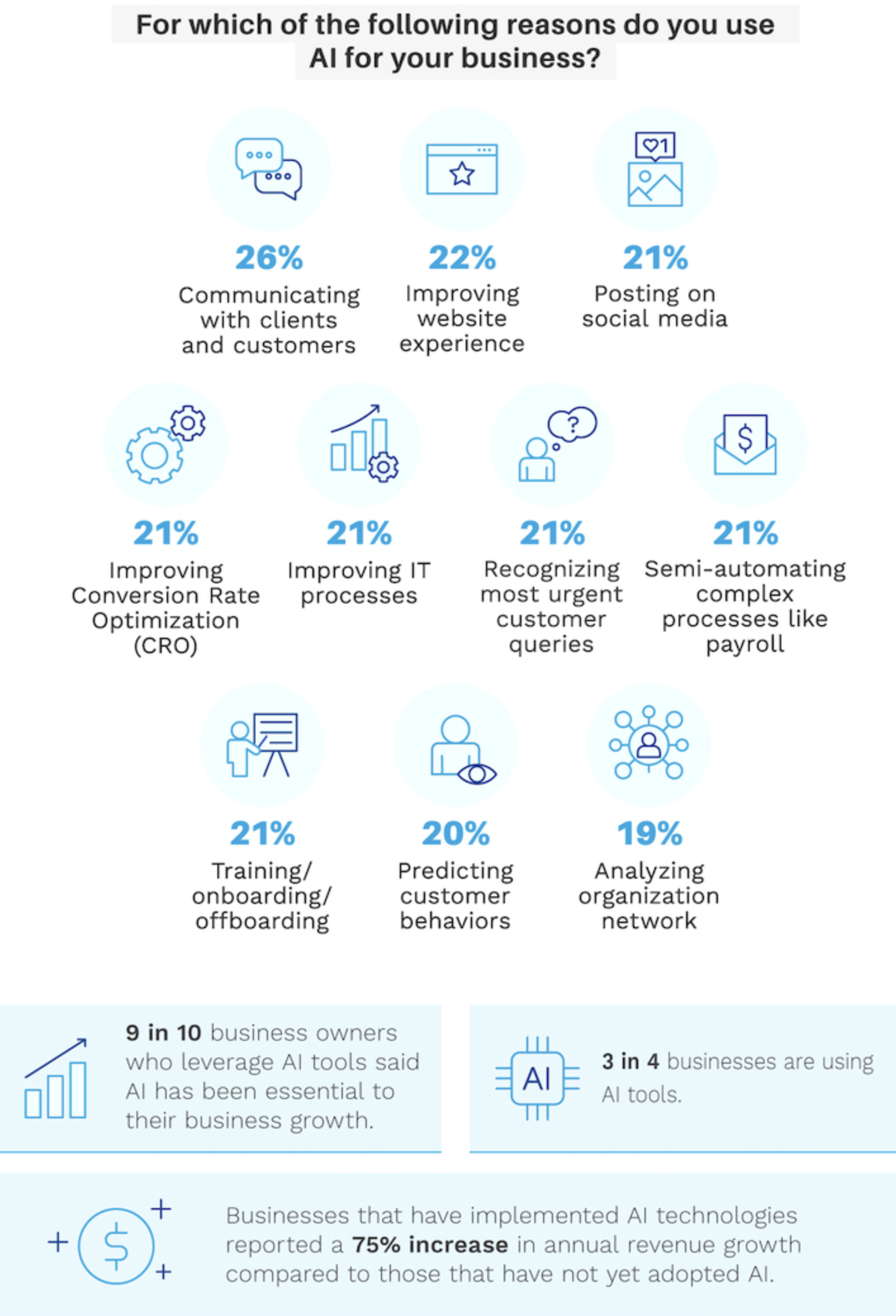What is Responsive Generative AI?
AI is the simulation of human intelligence in machines programmed to think and learn like humans. These machines can perform tasks that typically require human intelligence, such as visual perception, speech recognition, decision-making, and language translation. Artificial Intelligence (AI) is transforming the way small businesses operate. Researchers from OpenAI, OpenResearch, and the University of Pennsylvania predict that 80% of the US workforce will see the impact of generative AI tools on at least 10% of their tasks. (Source: https://foundationinc.co/lab/prompt-engineering-guide-marketers/?ref=refind) It is no longer just a technology reserved for large corporations but accessible to small business owners. AI technology has become more affordable and user-friendly and provides a competitive edge for small businesses. This blog post will explore how AI is changing small businesses.
Why Should Small Businesses Care About AI?
Small businesses can benefit from AI in various ways, such as automating repetitive tasks, providing personalized customer experiences, and making data-driven decisions. Learning about AI can help small businesses stay competitive, save time and resources, and improve overall efficiency. I thought these stats about AI and small businesses were interesting.
- According to a recent study, approximately 75% of small businesses plan to implement AI within the next three years.
- The global market for AI in small businesses is expected to reach $7.6 billion by 2023.
- AI-powered chatbots can save small businesses up to 30% on customer service costs.
- Small businesses that use AI for marketing and sales can increase their lead conversion rates by up to 50%.
- AI-powered inventory management systems can reduce stockouts by up to 80%.
- AI can help small businesses automate repetitive tasks, freeing valuable time for more critical work.
- AI-powered fraud detection systems can help small businesses reduce losses due to fraud by up to 40%.
- AI can help small businesses analyze customer data to gain insights into customer behavior and preferences.
- AI can help small businesses improve their cybersecurity by detecting and preventing cyber-attacks.
- AI can help small businesses improve their supply chain management by optimizing shipping routes and reducing delivery times.
Three Easy Ways To Start Using AI For Small Businesses
You can use AI to help enhance your writing and provide some inspiration on topics. One easy way to learn about AI is to take online courses or tutorials on platforms like Coursera, edX, or Udemy. These courses cover various topics, from basic concepts to more advanced techniques. Reading articles or watching Youtube videos on AI can also be helpful.
- AI can help small businesses improve their customer experience. Chatbots, for example, can answer customer inquiries and provide 24/7 customer support. Use chatbots to automate and personalize customer service interactions, recommend products on your website, or provide relevant information on your social media channels. This improves customer satisfaction and loyalty, making small businesses more competitive. Here is an interesting webinar from Zendesk and AWi on how to merge online and in-store shopping.
- AI can enhance sales and marketing efforts by implementing automated email campaigns that use AI to personalize content and improve engagement rates. AI can enhance sales and marketing efforts. AI-powered tools can analyze customer data to identify trends, preferences, and behavior patterns. This data can be used to create targeted marketing campaigns that increase sales and customer engagement. AI can also help small businesses automate their sales processes, such as lead generation and customer follow-up. Utilize AI-powered analytics tools to gain insights into customer behavior and preferences, allowing you to make data-driven decisions to improve your business.
- AI can increase efficiency and productivity . AI can help small businesses automate repetitive and time-consuming tasks, allowing them to focus on other essential business activities. For example, AI-powered tools can automate bookkeeping, inventory management, and administrative tasks. This increases efficiency and productivity, allowing small businesses to operate more effectively with fewer resources.
According to Marketing Profs, here is a great graphic showing how small businesses use AI.
AI on The Marketing Back End
- Feed the AI your sales emails and communications to find the most and least successful patterns.
- Import your customer service conversations and have AI look for common threads to improve your product.
The point is to make AI the invisible back-end machine in your marketing efforts without negatively impacting the user experience.
It’s not an easy balance to strike. But it’s a good approach if you’re excited to use AI in your marketing without risking brand perception.
Real-Life Marketing Client Example
We showcased the use of AI in Canva for a client developing an employee training portal. This new system will reduce writing and implementation time, allowing the team to efficiently learn the information they need to run the business successfully, even when the manager is away. The company can maintain consistency in operations and increase customer confidence by ensuring everyone is on the same page, setting clear expectations, and having a plan for various business situations. In addition, the client was excited about this project after learning about AI instead of dreading it! That is a win for any small business owner!
Disadvantages Of Using AI For Small Businesses
There is a new technology lifecycle, and while AI is still in the beginning stages, I think it is here to stay and will soon creep into every aspect of our society. However, be careful of some possible disadvantages of using AI for small businesses, including high implementation costs, potential job displacement, lack of customization for specific business needs, and possible technical issues or errors. AI is only as good as your prompt. Learn more about prompt engineering here. Additionally, AI may not be suitable for industries that require a high level of human interaction or creativity. In marketing, tone, expertise, and storytelling are critical elements of AI editing! However, these disadvantages can be mitigated by carefully planning and considering the specific business needs.
AI has become an essential technology for small businesses looking to stay competitive and improve their operations. Small businesses can achieve long-term success by enhancing customer experience, improving sales and marketing efforts, and increasing efficiency and productivity. Small business owners should consider integrating AI technology into their operations to take advantage of its benefits and stay ahead of the curve. In conclusion, integrating AI technology in small businesses can bring significant benefits such as increased efficiency, productivity, and customer satisfaction. However, it is important for small business owners to carefully consider their specific needs and limitations before implementing AI solutions. With the right approach and tools, AI can help small businesses thrive and stay competitive in an ever-changing market.
Additional AI Resources for Small Businesses
- Google AI for Small Business: A comprehensive guide introducing small business owners to artificial intelligence, its benefits, and how it can be applied to their businesses.
- IBM Watson Studio: A robust platform that offers small businesses various tools to build, train, and deploy AI models without requiring coding skills.
- NVIDIA Deep Learning Institute: A free online resource that offers a range of courses, tutorials, and hands-on labs to help small businesses learn about AI and its applications.
- Microsoft AI for Small Business: A collection of tools and services that offer small business owners access to AI capabilities, such as natural language processing, computer vision, and predictive analytics.
- Kaggle: A leading platform for data science and machine learning competitions, Kaggle offers small businesses a place to learn, collaborate, and compete with other data scientists and machine learning enthusiasts.
Additional Resources to Aid Your Marketing Journey
- The Complete A-Z Guide to Branding and Marketing Acronyms for Service-Based Businesses
- The Ultimate Guide to Building a Strong Service-Based Brand
- How to Create an Effective Digital Marketing Strategy for Service-Based Businesses
- The Power of Storytelling in Marketing Your Service-Based Business
- SEO Best Practices for Service-Based Businesses: Improve Search Rankings and Increase Organic Traffic



